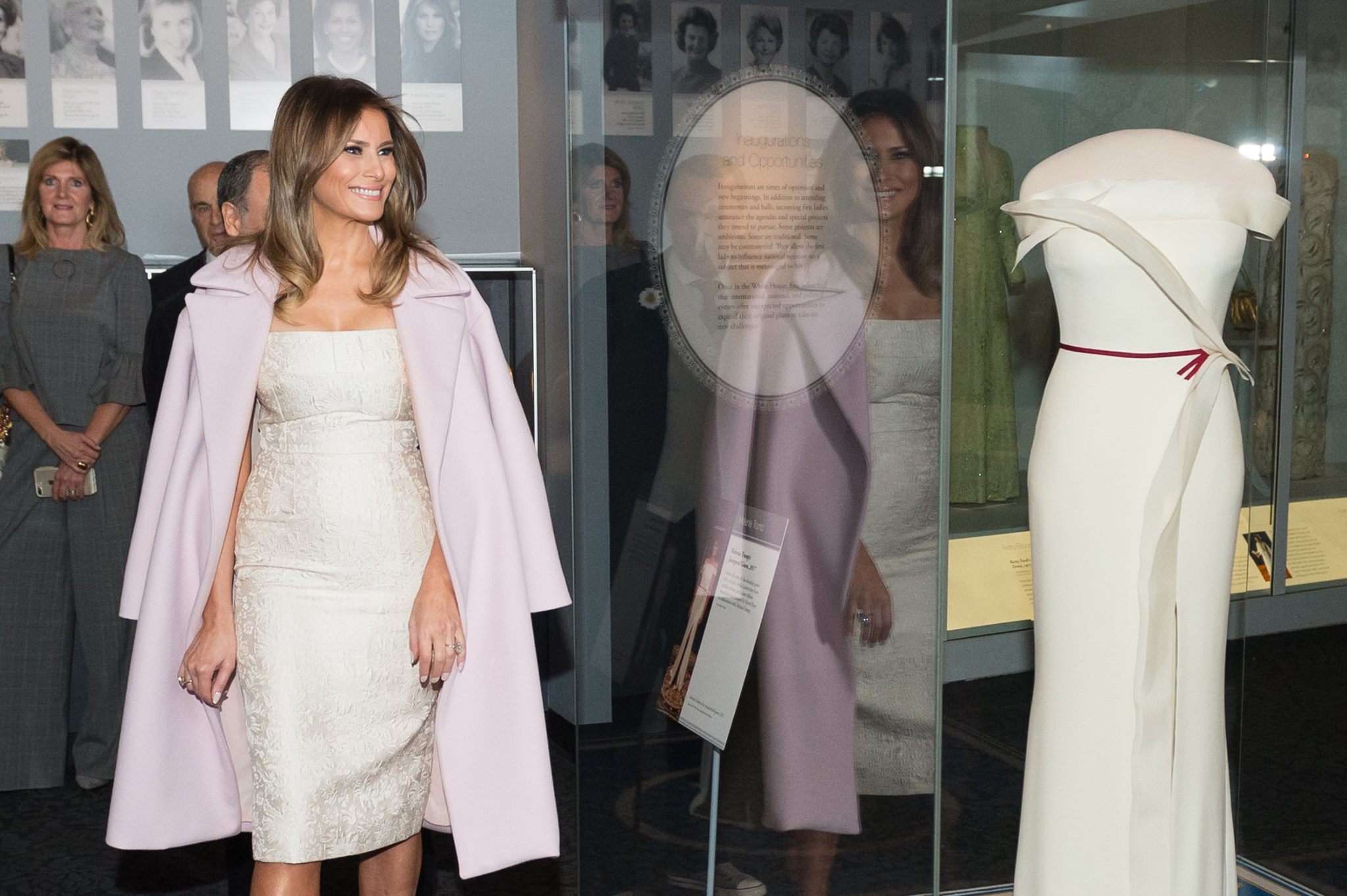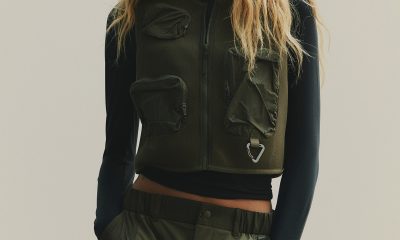Fashion and Beauty
Melania Trump’s fashion style true to her Europe roots

Slovenian-born Melania Trump has been unafraid to go against her husband’s “America First” agenda and stay true to her roots, if there’s a message to be taken from her bold, foreign-flavoured wardrobe in 2017. (Official White House Photo by Andrea Hanks via The White House/Flickr, Public Domain)
PARIS—Slovenian-born Melania Trump has been unafraid to go against her husband’s “America First” agenda and stay true to her roots, if there’s a message to be taken from her bold, foreign-flavoured wardrobe in 2017.
In her first year as first lady, Mrs. Trump has often wrapped herself in the clothes of her home continent as several American designers publicly refused to dress her in what was a fashion industry-wide backlash against her unpopular spouse.
The first first lady to be born in continental Europe, Trump grew up in Sevnica in Slovenia, in the southern Balkans, just over 100 kilometres (60 miles) from the Italian border. Her first real taste for fashion came while living in Paris as a young model in the mid-1990s, years before she got U.S. citizenship in 2006.
From designs by Dolce & Gabbana, Del Pozo, Christian Dior, Emilio Pucci, Givenchy and Valentino to daringly high Christian Louboutin heels, the 47-year-old first lady’s touchstones have not only been the Old World, but its most established — and expensive — design houses.
As the wife of a billionaire, Mrs. Trump can afford to spend into the five figures for a garment and seems unconcerned about how that squares with voters in President Donald Trump’s political base.
Since becoming first lady, Mrs. Trump has chosen Herve Pierre, a French-born immigrant, as her fashion adviser. Politics be damned: He’s helped her hone looks that emphasize the sleeve, eye-popping colours and big sunglasses, and show off her svelte, 5-foot-11 frame and thick, dark hair.
“In the news, we speak a lot of politics, so if for a moment we can forget about it and enjoy something else, why not?” Pierre told AP.
Mrs. Trump’s old-school, dressed-to-the-nines glamour and full fabrics evoke distance not only in how far the clothes have had to travel, but in perceptions that the first lady, who only moved to the White House in June and rarely speaks publicly, is reserved in her persona.
Not since Jackie Kennedy has a U.S. first lady had such a European esthetic as Mrs. Trump.
Although she wore Ralph Lauren to the inauguration and has also shown a penchant for U.S. brands such as Michael Kors and Calvin Klein, many of her most recognizable looks have been foreign designed and assembled.
It’s a striking contrast with Michelle Obama — who famously used her first lady wardrobe as a way of championing often young American designers, and with Laura Bush and Hillary Clinton, who stuck closely to U.S. fashion brands.
Most of Mrs. Trump’s clothes are bought off-the-rack from a retailer without the design house’s knowledge that the garment is destined for the first lady.
This is highly unusual — and contrasts with Mrs. Obama’s frequent collaborations with designers.
Perhaps it’s not Mrs. Trump’s choice, given her husband’s unpopularity.
People from 17 fashion brands that Mrs. Trump wears declined to comment on the first lady when contacted by AP, even though she is among the world’s most photographed women.
It’s a deafening silence, especially given that it’s an industry Mrs. Trump actually worked in.
Walking the path of both foreign and highly priced glamour presents its share of risks for any first lady. (Mrs. Kennedy was criticized for wearing Parisian stalwart Chanel.)
But in an “America First” administration, Mrs. Trump is particularly vulnerable to criticism as her husband assails immigration and plays to blue-collar supporters.
While the fashion press gushed over a brightly colored, floral D&G silk coat Mrs. Trump wore in Sicily in May, political commentators didn’t have such a rosy view of the garment’s over-$50,000 price tag.
It cost, they quickly pointed out, more than the average annual U.S. household income. Mrs. Trump was criticized for a Marie Antoinette-style wardrobe as the president’s ill-fated attempt to repeal “Obamacare” was being considered, an effort that might have stripped millions of people of their insurance.
She was praised for getting it right when she wore $50 converse sneakers and $185 J Brand jeans (despite the $1,100 Balmain shirt) during a day spent digging around the White House vegetable garden with children.
Since the television age, the first lady’s wardrobe has invariably invited vibrant political critique.
It’s an impossible game to win.
Mrs. Obama was criticized for wearing $540 Lanvin sneakers at a food bank in Washington — despite twinning them with a more affordable J.Crew cardigan.
Rosalynn Carter was berated during the 1970s oil crisis for being too unglamorous when she wore an off-the-rack gown to the 1977 inaugural ball, after having worn it to a previous ball.
If there’s a message in Mrs. Trump’s fashion — it’s that she dresses to look good, in keeping with the expensive personal taste she’s acquired since marrying Trump in 2005. Political meaning isn’t part of the equation.
“She does not concern herself with what others think about her fashion and always stays true to herself,” Stephanie Grisham, a spokeswoman for the first lady, told AP. “Mrs. Trump wears what she likes, and what is appropriate for the occasion.”
Adds Pierre, via email: “She has and had already a very personal style in fashion, before she was first lady. As you can see she likes suits and structured dresses, I work keeping her vision in mind.”
Sometimes, Mrs. Trump’s looks contain a veiled reference to the event she’s dressing for.
She wore an iconic piece of French fashion — a red Christian Dior bar jacket — for the Trumps’ visit to Paris in July.
But the references vary in degrees of subtlety and can sometimes be heavy-handed.
In May, Mrs. Trump passed up the traditional headscarf in Saudi Arabia in favour of a Ralph Lauren shirtdress in khaki. The dress evoked the Arabian Desert, and its military-style epaulettes and pockets suggested the garb of troops in the Middle East.
When Indian Prime Minister Narendra Modi visited the White House, Mrs. Trump dressed in a maxi-dress from Italian house Pucci. The gown’s wild print and bright yellow colour might well have been chosen to capture the vibrancy of the subcontinent and the hue of its flag.
Mrs. Trump has a great passion for fashion, and alongside former Carolina Herrera design chief Pierre, has shown she’s not afraid of bold style statements even if it upstages her political ventures.
The bright pink belted Del Pozo dress with dramatic leg of mutton sleeves that she wore for an address at the United Nations seemed to take precedence over the actual speech she gave on the importance of protecting children’s interests.
When she departed the White House to visit hurricane-damaged Texas last year, her impractically high stilettos, though chic, upstaged the trip and set off a social media backlash. She changed into sensible sneakers before deplaning in Texas, but the damage already had been done.
Much like her husband, who has tried to undo much of Barack Obama’s legacy, many of Mrs. Trump’s fashion choices seem to be the polar opposite of her predecessor’s.
Her high-end European clothes contrast with Mrs. Obama’s buy-American wardrobe priority and the relatable image she honed by mixing high-priced garments with more popular brands.
Mrs. Obama was associated with sleeveless styles that showed off her famously toned arms — and promoted her get-fit initiatives as first lady.
Mrs. Trump’s signature style is the dramatic, often covered, sleeve.
A white sheath from British designer Roksanda that Mrs. Trump wore at the Republican National Convention gained attention for its striking bell sleeves. Mrs. Trump also garnered attention for wearing a bright red Givenchy cape dress with bold floppy sleeves as she joined the president for a trip to Palm Beach, Florida. In another twist on that style, Mrs. Trump sometimes wears coats, such as a pink number in October by Swedish house Acne, draped over the shoulders with the sleeves hanging limp. It does away with the hands — and adds to the subliminal message that her priority is to be a fashionable, but not hands-on, first lady.
Madrid-based fashion house Del Pozo has gained unparalleled publicity for its sculptural, pret-a-couture creations being worn by Mrs. Trump, but that hasn’t affected its communications policy.
The house told AP: “Melania Trump is a normal client that buys from a retailer in the U.S. and we don’t comment on private clients. We’ve never had contact with her team.”
By contrast, designers generally were eager to talk about dressing Mrs. Obama.
Many may have heeded lessons from the unpleasant experience of a few designers who have supported Mrs. Trump publicly — such as Ralph Lauren, Dolce & Gabbana and Beirut-born Reem Acra. They all faced criticism on social media and would not comment to AP.
Stefano Gabbana told his online critics to “go to hell” when he revealed himself to be among Mrs. Trump’s most passionate supporters — posting a photo of her in D&G on his Instagram account to instant criticism.
And when Mrs. Trump wore Ralph Lauren at the White House, some even threatened to boycott the house.
For the fashion industry, it’s perhaps a case of once bitten, twice shy.























